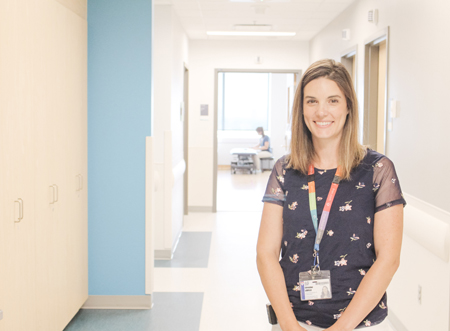A day in the life of an… occupational therapist

October is National Occupational Therapy Month in Canada
Christine Labelle, an occupational therapist who works in the Neonatal Intensive Care Unit (NICU) and the Neonatal Follow-Up Clinic at the Montreal Children’s Hospital, easily sums up her work when her children ask what mom does: “I tell them I’m going to take care of babies; to help them learn how to feed and develop,” she says.
Christine started working in the NICU in 2005 after graduating from McGill University. She had always wanted to work in pediatrics, and she had a strong interest in working with neonates. She felt extremely privileged when she ultimately became one of the few occupational therapists in Quebec working in a NICU.
Stepping into the role was initially intimidating, yet she was immediately won over by the work.
“The first time I held a baby to give them a bottle and to evaluate their oral feeding skills, I thought to myself, ‘I’m so fortunate to be here and to do this’. I continue to feel extremely lucky to be able to work with such a vulnerable population and to work every day with a wonderful team and amazing families. This is not just a ‘job’; it is truly a privilege to be working in an area where you can learn every day and to feel like you make a difference.”
Christine’s patients include premature infants and babies whose conditions require special care. Her work begins when a child is born; she will assess and address an infant’s risk of developing feeding difficulties, or if they are already experiencing them, plus the infant’s risk for developmental delays. ‘Neuroprotective’ care for the newborn population in the NICU is important because Christine works with fragile babies whose environment can directly affect their development. She helps families understand their baby’s cues and discusses appropriate strategies to limit the stress the newborn will undergo during the NICU stay. The goal is to optimize the baby’s development and educate families about how to stimulate and encourage oral feeding.
“In the NICU, you work with parents and babies who have gone through a lot in a fragile period of life. There are many difficult cases, and moments when we have to deliver bad news to a family; those are some of the most challenging. But it’s these same families who pick us up and motivate us – they are so resilient and so courageous in the face of a difficult situation,” says Christine. “Plus, every time a baby smiles, it’s the best reward anyone could ask for.”
 Sticking to a daily routine is essential for the health of Christine’s patients. Christine needs to constantly adapt her daily schedule to the babies’ to see them at optimal times that benefit them.
Sticking to a daily routine is essential for the health of Christine’s patients. Christine needs to constantly adapt her daily schedule to the babies’ to see them at optimal times that benefit them.
“I will always make sure that I do not disturb a baby’s sleep and I will adapt my intervention depending on the level of stress the baby may already have experienced that day,” Christine says. “We can provide early intervention and refer to the services they may need as early as possible.”
Christine shares her workload with fellow occupational therapist, Sarah Milton. This team of two liaises with the larger multidisciplinary team that includes physiotherapists, nutritionists, social workers, and physicians.
On the day we met, Christine was seeing an infant in the NICU who was born with multiple congenital malformations, including facial and cranial malformations that would affect her ability to feed by mouth as well as her breathing. Despite several craniofacial surgeries, this little girl was developing positively and eating and drinking well. She was set to be discharged after 13 months of admission.
“It’s always interesting to see each patient’s progress,” Christine says. “At first, parents often experience a certain amount of shock and stress as an admission to the NICU is always very traumatic. But to see where the baby started and how far they have come, and to see the child happy and developing well is so rewarding.”


